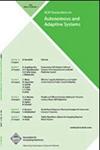建模、复制和预测人类行为:综述
IF 2.2
4区 计算机科学
Q3 COMPUTER SCIENCE, ARTIFICIAL INTELLIGENCE
引用次数: 4
摘要
鉴于人们普遍认为人类推理是学习和决策的标准,在人工系统中复制这些天生的人类能力的研究已经取得了重大的努力和日益增长的趋势。因此,包括博弈论、心智理论和机器学习等主题,整合了人类推理的假设组成部分的概念。这些都是复制和理解人类行为的技术。此外,下一代自主和自适应系统将主要包括人工智能代理和人类作为团队一起工作。为了实现这一目标,自主代理需要能够嵌入实用的人类行为模型,使它们不仅能够复制人类模型作为一种“学习”的技术,而且能够理解用户的行为并预测他们的行为,从而真正与他们共生。本文的主要目的是提供一个简洁而系统的回顾在两个领域处理人类行为的定量模型的重要方法。具体来说,我们专注于(i)通过探索和反馈学习行为模型或策略的技术,如强化学习,以及(ii)直接建模人类推理机制,如信念和偏见,而不必通过试错来学习。本文章由计算机程序翻译,如有差异,请以英文原文为准。
Modeling, Replicating, and Predicting Human Behavior: A Survey
Given the popular presupposition of human reasoning as the standard for learning and decision making, there have been significant efforts and a growing trend in research to replicate these innate human abilities in artificial systems. As such, topics including Game Theory, Theory of Mind, and Machine Learning, among others, integrate concepts that are assumed components of human reasoning. These serve as techniques to replicate and understand the behaviors of humans. In addition, next-generation autonomous and adaptive systems will largely include AI agents and humans working together as teams. To make this possible, autonomous agents will require the ability to embed practical models of human behavior, allowing them not only to replicate human models as a technique to “learn” but also to understand the actions of users and anticipate their behavior, so as to truly operate in symbiosis with them. The main objective of this article is to provide a succinct yet systematic review of important approaches in two areas dealing with quantitative models of human behaviors. Specifically, we focus on (i) techniques that learn a model or policy of behavior through exploration and feedback, such as Reinforcement Learning, and (ii) directly model mechanisms of human reasoning, such as beliefs and bias, without necessarily learning via trial and error.
求助全文
通过发布文献求助,成功后即可免费获取论文全文。
去求助
来源期刊

ACM Transactions on Autonomous and Adaptive Systems
工程技术-计算机:理论方法
CiteScore
4.80
自引率
7.40%
发文量
9
审稿时长
>12 weeks
期刊介绍:
TAAS addresses research on autonomous and adaptive systems being undertaken by an increasingly interdisciplinary research community -- and provides a common platform under which this work can be published and disseminated. TAAS encourages contributions aimed at supporting the understanding, development, and control of such systems and of their behaviors.
TAAS addresses research on autonomous and adaptive systems being undertaken by an increasingly interdisciplinary research community - and provides a common platform under which this work can be published and disseminated. TAAS encourages contributions aimed at supporting the understanding, development, and control of such systems and of their behaviors. Contributions are expected to be based on sound and innovative theoretical models, algorithms, engineering and programming techniques, infrastructures and systems, or technological and application experiences.
 求助内容:
求助内容: 应助结果提醒方式:
应助结果提醒方式:


